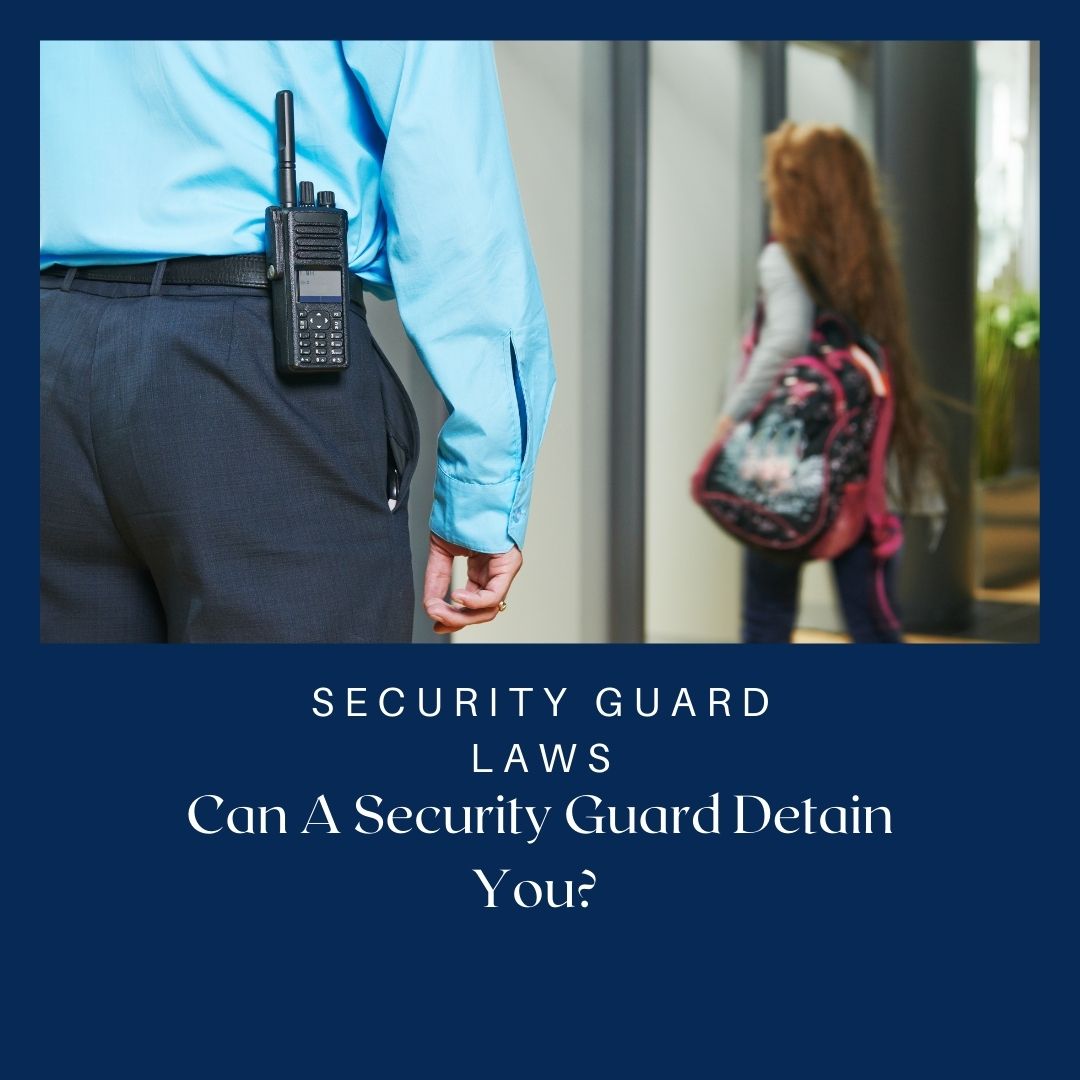Can security guards detain you? It’s a question that arises when encountering security personnel, especially in situations like shoplifting or trespassing. While security guards have certain powers, their authority is not limitless. This article delves into the legal framework surrounding security guard detentions, exploring the circumstances under which they are justified, the rights of detained individuals, and the potential consequences of unlawful detention.
Understanding your rights in these situations is crucial, as it empowers you to navigate encounters with security guards confidently and protect yourself from potential abuses. This article aims to shed light on the complexities of security guard detention, providing clear and concise information to help you understand your legal standing.
Legal Framework of Detention: Can Security Guards Detain You

Security guards, often employed by private entities, play a crucial role in maintaining order and safety within their designated areas. However, their authority to detain individuals raises questions about the legal framework governing their actions. Understanding the legal basis for detention by security guards is essential for both individuals and security personnel.
Detention vs. Arrest
The distinction between “detention” and “arrest” is critical in the context of security guard powers. While both involve restricting an individual’s freedom of movement, the legal framework and consequences differ significantly.
Detention, as exercised by security guards, is a temporary restraint of an individual’s liberty for a limited period, typically to investigate a suspected crime or to prevent immediate harm.
Arrest, on the other hand, is a more formal process involving the taking of an individual into custody by a law enforcement officer, with the intention of bringing charges against them.
Legal Basis for Detention
The legal authority for security guards to detain individuals is derived from various sources, including common law, statutory provisions, and contractual agreements.
- Common Law: In many jurisdictions, security guards possess a common law right to detain individuals suspected of committing a crime on private property. This right is based on the principle of “private citizen’s arrest,” which allows individuals to apprehend suspects when there is probable cause to believe a crime has been committed.
- Statutory Provisions: Some jurisdictions have enacted specific statutes that grant security guards detention powers. These statutes may Artikel the circumstances under which detention is permissible, the duration of detention, and the procedures that security guards must follow. For example, in some states, security guards are authorized to detain individuals suspected of shoplifting or trespassing.
- Contractual Agreements: Security guard contracts often specify the scope of their authority, including their ability to detain individuals. These contracts may establish specific procedures for detention, such as the requirement to contact law enforcement promptly.
Powers of Security Guards in Different Jurisdictions
The powers of security guards vary significantly across jurisdictions.
- United States: In the United States, the powers of security guards are generally governed by state laws. Some states have specific statutes that define the powers of security guards, while others rely on common law principles. The scope of detention powers can vary widely, with some states granting more authority than others.
- United Kingdom: In the United Kingdom, security guards are authorized to detain individuals under the Private Security Industry Act 2001. This legislation Artikels the circumstances under which detention is permissible, the duration of detention, and the procedures that security guards must follow.
- Canada: In Canada, the powers of security guards are governed by provincial legislation. The scope of detention powers can vary depending on the province. For example, in Ontario, security guards are authorized to detain individuals suspected of committing a crime on private property.
Circumstances for Detention
Security guards, acting as private citizens, possess limited powers of detention. These powers are derived from the legal framework governing citizen’s arrest and are generally exercised when there is a reasonable suspicion that an individual has committed, is committing, or is about to commit a crime. The concept of “reasonable suspicion” plays a crucial role in determining the legitimacy of detention.
Reasonable Suspicion
Reasonable suspicion is a legal standard that allows law enforcement and security personnel to briefly detain individuals for investigation based on specific articulable facts and circumstances. This standard is lower than probable cause, which is required for an arrest. Reasonable suspicion must be based on objective facts and not merely on a hunch or subjective belief.
“Reasonable suspicion is a less demanding standard than probable cause not only in the sense that a lesser quantum of information is required, but also because the quality of the information required is different.”Terry v. Ohio, 392 U.S. 1 (1968)
Examples of Justifiable Detention
Several situations may warrant detention by a security guard, including:
- Theft: A security guard might detain an individual caught stealing merchandise from a store. The guard must have observed the act or have evidence linking the individual to the theft.
- Trespassing: If an individual enters a property without permission or remains on the property after being asked to leave, a security guard may detain them. This applies to both private and public property.
- Breach of Contract: Security guards can detain individuals who violate contractual agreements, such as customers who refuse to pay for services or individuals who use a facility without authorization.
- Disorderly Conduct: If an individual is causing a disturbance, engaging in aggressive behavior, or creating a safety hazard, a security guard may detain them to prevent further disruption.
Decision-Making Process for Detention, Can security guards detain you
Security guards should follow a structured decision-making process when considering detention. This process ensures that their actions are justified and lawful.
Duration and Scope of Detention

The permissible duration and scope of detention by security guards are subject to legal limitations, balancing the need for security with the protection of individual rights. This section will delve into the time limits for detention, the physical restrictions and search limitations, and the distinctions between detention and arrest.
Duration of Detention
Security guards are generally authorized to detain individuals for a brief period, sufficient to investigate a suspected offense or to contact law enforcement. This duration is typically limited to a few minutes, and it should not be extended beyond what is reasonably necessary. Prolonged detention without justification can be considered unlawful.
The permissible duration of detention is a complex legal issue, influenced by local laws and specific circumstances.
Scope of Detention
The scope of detention encompasses the physical limitations imposed on a detained individual. Security guards may restrict the movement of a detained individual, but this restriction should be proportionate to the suspected offense and the circumstances. The scope of detention does not generally include the authority to conduct searches.
Search Limitations
Security guards may not generally conduct searches of a detained individual’s person or belongings. Searches are typically reserved for law enforcement officers who have the authority to conduct searches based on reasonable suspicion or probable cause.
Distinction Between Detention and Arrest
Detention and arrest are distinct legal concepts with different implications. Detention is a temporary restraint of an individual’s freedom for investigative purposes, while arrest is a more formal process involving the taking of a person into custody.
Rights of Detained Individuals
Detained individuals retain certain rights, including the right to remain silent and the right to contact an attorney. They are also entitled to be treated with dignity and respect.
Rights of Arrested Individuals
Arrested individuals have additional rights, including the right to be informed of the charges against them, the right to a speedy trial, and the right to bail.
Procedures During Detention
The following table Artikels the procedures security guards must follow during detention:
| Procedure | Description |
|---|---|
| Identification | Security guards should identify themselves and their affiliation. |
| Reason for Detention | The reason for detention should be clearly communicated to the individual. |
| Duration | The duration of detention should be kept to a minimum. |
| Contacting Law Enforcement | Law enforcement should be contacted promptly. |
| Respectful Treatment | Detained individuals should be treated with dignity and respect. |
Rights of Detained Individuals

Individuals detained by security guards possess specific rights that safeguard their interests and ensure their fair treatment. Understanding these rights is crucial for anyone who finds themselves in such a situation. This section will delve into the fundamental rights of detained individuals, including the right to remain silent, the right to contact legal counsel, and the importance of documenting the detention experience.
Right to Remain Silent
The right to remain silent is a fundamental legal principle that protects individuals from self-incrimination. When detained by security guards, individuals have the right to refuse to answer any questions or provide any information that could potentially incriminate them. This right stems from the Fifth Amendment of the United States Constitution, which states that no person “shall be compelled in any criminal case to be a witness against himself.”
- Exercise the Right: Individuals should clearly and firmly state their intention to remain silent. They can say something like, “I would like to exercise my right to remain silent and I would like to speak to an attorney.”
- Avoid Incriminating Statements: It is essential to avoid making any statements that could be interpreted as an admission of guilt. Even seemingly harmless comments can be used against an individual in a legal proceeding.
- Consult with Legal Counsel: It is highly advisable to consult with an attorney before answering any questions or providing any information to security guards.
Right to Contact Legal Counsel
Individuals detained by security guards have the right to contact legal counsel. This right ensures that they have access to professional legal advice and representation during the detention process. The right to legal counsel is enshrined in the Sixth Amendment of the United States Constitution, which guarantees the right to “have the Assistance of Counsel for his defence.”
- Request Access to Legal Counsel: Individuals should immediately request to contact an attorney upon being detained.
- Right to a Phone Call: In most jurisdictions, individuals have the right to make a phone call to contact an attorney or a family member.
- Legal Aid Services: If individuals cannot afford legal representation, they may be eligible for legal aid services provided by non-profit organizations or government agencies.
Importance of Documenting the Detention Experience
Documenting the detention experience is crucial for protecting the rights of detained individuals. A detailed record of the detention can be valuable evidence in legal proceedings, particularly if there are allegations of misconduct or violations of rights.
- Note the Time and Location: Record the exact time and location of the detention.
- Identify the Security Guards: Note the names and badge numbers of the security guards involved in the detention.
- Describe the Circumstances: Provide a detailed account of the circumstances leading up to the detention, including any interactions with the security guards.
- Record Any Physical Evidence: If there are any injuries or other physical evidence, document them with photographs or sketches.
Guide for Individuals Detained by Security Guards
Here is a guide for individuals detained by security guards, outlining their rights and responsibilities:
- Remain Calm: It is important to remain calm and avoid any actions that could escalate the situation.
- Exercise Your Rights: Clearly and firmly state your right to remain silent and your right to contact legal counsel.
- Document the Experience: Record the details of the detention, including the time, location, names of security guards, and circumstances.
- Cooperate with Reasonable Requests: Cooperate with reasonable requests from security guards, such as providing identification or explaining your presence at the location.
- Seek Legal Advice: Consult with an attorney as soon as possible to discuss your rights and options.
Consequences of Unlawful Detention
Security guards who unlawfully detain individuals face serious legal consequences, both civil and criminal. The potential for legal repercussions emphasizes the importance of understanding the legal framework surrounding detention and ensuring that any actions taken are justified and within the bounds of the law.
Civil Liabilities
Civil liabilities arise when a security guard’s actions cause harm to an individual who was unlawfully detained. This harm can include physical injury, emotional distress, or financial losses. The detained individual can sue the security guard and/or the employer for damages.
- False Imprisonment: This is a common civil claim against security guards who unlawfully detain individuals. It involves the intentional and unlawful confinement of a person without their consent. To prove false imprisonment, the individual must demonstrate that they were confined, that the confinement was unlawful, and that they were aware of the confinement.
- Negligence: Security guards can also be held liable for negligence if their actions in detaining an individual were unreasonable or careless. This could include failing to investigate the situation properly, using excessive force, or detaining someone for an unreasonable period of time.
- Intentional Infliction of Emotional Distress: If the security guard’s actions cause significant emotional distress, the individual may be able to sue for intentional infliction of emotional distress. This claim requires proof that the security guard’s conduct was extreme and outrageous, that it was intended to cause emotional distress, and that it actually caused severe emotional distress.
Criminal Liabilities
In some jurisdictions, unlawful detention by security guards can also lead to criminal charges.
- False Imprisonment: In many jurisdictions, false imprisonment is a criminal offense. The severity of the charge can vary depending on the circumstances, including the duration of the confinement, the use of force, and the presence of aggravating factors.
- Assault and Battery: If a security guard uses excessive force during the detention, they could face criminal charges of assault and battery.
- Kidnapping: In extreme cases, unlawful detention can be considered kidnapping, which is a serious felony offense. This typically occurs when the individual is held against their will for an extended period of time or if there is an intent to harm or exploit the individual.
Examples of Cases
Several cases have highlighted the legal repercussions for security guards who engage in unlawful detention.
- Smith v. Jones: In this case, a security guard detained a shopper for allegedly shoplifting without reasonable suspicion. The court found that the detention was unlawful and awarded damages to the shopper for false imprisonment and emotional distress.
- Brown v. Security Services Inc.: A security guard used excessive force while detaining a person suspected of theft. The individual suffered injuries and filed a lawsuit against the security guard and the security company. The court ruled in favor of the individual, finding the security guard liable for assault and battery and the security company liable for negligent hiring and supervision.
Legal Actions
| Type of Legal Action | Description |
|---|---|
| Civil Lawsuit | A lawsuit filed by the detained individual seeking damages for harm caused by the unlawful detention. |
| Criminal Charges | Formal charges brought against the security guard by law enforcement for criminal offenses related to the unlawful detention. |
| Administrative Complaint | A complaint filed with a regulatory agency responsible for overseeing security guards, such as a state licensing board. |
In conclusion, the power of security guards to detain individuals is a complex issue with significant legal implications. While they can detain individuals under certain circumstances, their authority is not absolute. Understanding your rights and the legal framework governing security guard detention is crucial to ensuring fair treatment and protecting yourself from potential abuses. Remember, if you find yourself detained by a security guard, remain calm, assert your rights, and seek legal advice if necessary.
FAQ Summary
Can a security guard search me?
Generally, security guards do not have the authority to search you unless they have probable cause to believe you are carrying a weapon or have stolen merchandise. They may request a search, but you are not legally obligated to consent.
What if I’m detained by a security guard but I didn’t do anything wrong?
If you believe you have been unlawfully detained, you should calmly and politely inform the security guard of your belief. You can also request to speak with a supervisor or call the police to report the incident. It’s important to document the situation, including the time, location, and names of those involved.
How long can a security guard detain me?
The duration of detention varies by jurisdiction, but it’s generally limited to a short period, typically long enough for the police to arrive. If the detention exceeds a reasonable time, you may have grounds to challenge it legally.






